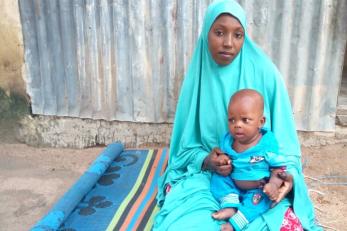How a young mother became an advocate for exclusive breastfeeding

Why exclusive breastfeeding?
Several studies have found that optimal breastfeeding practices can reduce child mortality by 12 to 20%, more than any other preventative practice. Even the World Health Organization estimates that increased breastfeeding could avert 20,000 maternal deaths each year due to breast cancer.
Breastfeeding and looking after a child after giving birth can be one of the most challenging and stressful times for a new mother. To make this transition easier for mothers, Mercy Corps Nigeria’s Responsive Economic Assistance for Conflict-Affected Households (REACH 4) program is providing mothers with information, guidance, and support on breastfeeding practices. We are able to create an encouraging environment for women to share their stories and support each other, through Mother to Mother Support Groups, community sensitization exercises, and door to door visits by nutrition assistants and promoters.
One of these mothers is Hauwa, a 30-year-old, with three children living in Wuyaram community in Damboa Local Government Area (LGA), Borno state. After hearing a lot about the benefits of only giving breast milk (exclusive breastfeeding) to your child from birth till the age of six months through the numerous sensitization sessions in her community by Mercy Corps and from other mothers. Hauwa was convinced that she needed to try it.
“I had not been able to try exclusive breastfeeding with my first two children because my mother-in-law did not allow me to. But with everything I now know about it, I decided to give it a try with my third child, Mohammed.”

Her experience from day one
“As soon as I gave birth to my son, Mohammed, the midwife put him on my chest and to my surprise he took just a few minutes to discover my breast and started sucking it right away. Despite the pain I was still in, when I saw him holding on to my breast for the first time I felt the joy and warmth of motherhood . I can’t describe how happy I was in that moment, but I believe every mum has to experience it to understand.”
Since Hauwa had an uncomplicated delivery, she was able to breastfeed her son within one hour after delivery, which is highly recommended by nutrition experts. Initially, for the first couple of days after giving birth she was not producing enough breast milk to satisfy her son. But she was determined to persevere and did not heed to the pressure from some nurses to supplement her breast milk with infant formula. By the third day after his birth, her milk started flowing well and she was very excited.
“I’m glad I never gave up on giving only breast milk, because I noticed that feeding my son, Mohammed anytime he was hungry, really helped stimulate my breast milk production.”
After being discharged from the hospital, Hauwa noticed her son still had a fever, which she was told by the doctor would reduce at a slower pace than babies who are bottle fed with infant formula She also observed that Mohammed slept continuously for long periods and needed to be woken up for frequent feedings. By the seventh week, Hauwa was worried and took him to the hospital. The test results confirmed that her son was experiencing breast milk jaundice (a condition that can occur with breastfeeding infants while their liver is still developing). However, she was told the condition generally does not cause problems and eventually goes away on its own.
Hauwa is proud to have only given her son breast milk for his first 6 months and even now at 7 months, he is still drinking breast milk in addition to other foods.
The benefits of exclusive breastfeeding
Her advice to mothers out there is, “Keep breastfeeding no matter what, because breastmilk is the best thing you can give your child at this time of their lives.” Hauwa tells us that this thought and positive thinking is what really motivated her and kept her going when things got difficult.
She reaped many benefits from her experience with exclusive breastfeeding such as losing all her pregnancy weight within the first 4 months after delivery and her baby gaining weight properly. Although she was in pain when the baby sucked heavily, the recovery was fast and since she left the hospital neither she nor her baby has fallen sick.
Hauwa is now an advocate for exclusive breastfeeding in her community and plans to exclusively breastfeed the rest of her unborn children because she is so happy with the experience.
“I noticed that breastfeeding has kept me closer to my son. My body now instinctively knows when it’s time to breastfeed. It has also saved me time, money, and fear of frequent hospital runs. I am encouraging other mothers to try exclusive breastfeeding because it worked for me and I believe it will work for others too.”
About REACH 4
Responsive Economic Assistance to Conflict-Affected Households (REACH 4) is a food security and nutrition program funded by the United States Agency for International Development Office for Food For Peace (USAID FFP) and is in its fourth iteration.
REACH 4 aims to support 13,512 vulnerable households consisting of over 94,000 individuals in Damboa, Borno state. The program provides benefits ranging from dry food vouchers and complementary nutrition activities (screening for malnutrition, mother to mother support groups and distribution of vouchers for fresh vegetables, fruits, meat, fish and eggs) to ensure that conflict-affected households consume an adequate and nutritious diet. REACH 4 aims to build the resilience of these households by investing in their food security and nutrition.